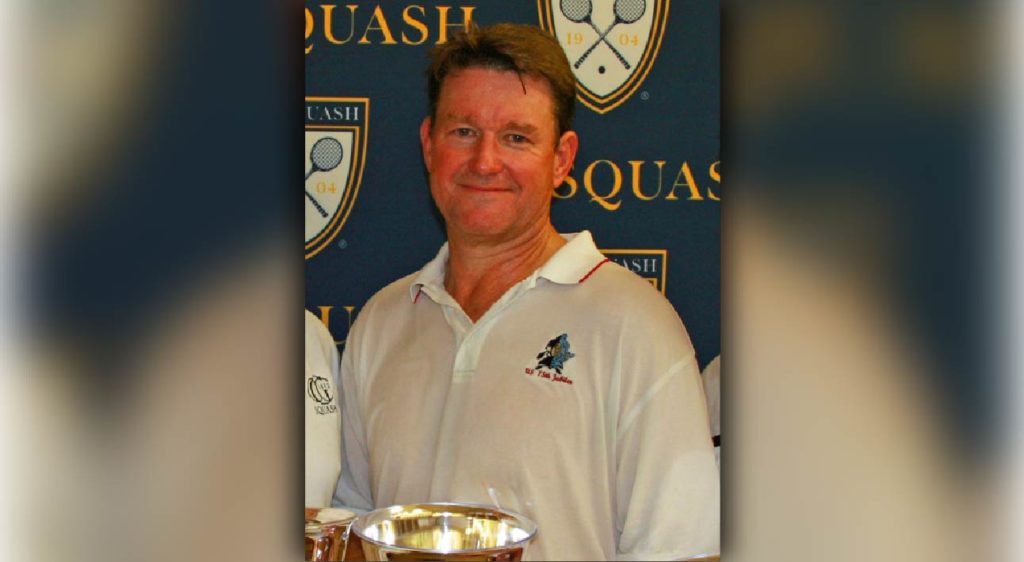
Eben Hardie, III, a longtime squash leader in Atlanta, died on Sunday, suffering a heart attack in his sleep. He was sixty years old. Hardie was the chair of the board of US Squash in 1999-2001.
Hardie was born and raised in New Orleans. A strong tennis player, he played tennis at the University of Pennsylvania. His coach, Al Molloy, also led the squash team and persuaded Hardie to pick up the sport. Hardie played on the junior varsity and then the varsity. As he said years later at a Penn squash event, “I found a game and a group of people with whom I have stayed friends my entire life. There is no better group of people than squash people, and I say that as someone who has continued to compete on a national and regional basis in squash and tennis, and spent a lot of time in golf circles. And as I have traveled to every town in the U.S. and Canada, I have always had a friend in those towns that played squash, and whose hospitality and friendship was unquestioned. It changed my life. For the better. Significantly.”
An industrial real estate developer, Hardie was a strong leader in Atlanta squash, at the Piedmont Driving Club and with the Southeast Squash district association. He also was a national leader, guiding US Squash at a critical time. Hardie was also a top player. In singles he won the men’s national hardball 30+ in 1990 and 1992 and the softball 40+ in 1999; in doubles, he won the men’s national 50+ in 2010 and 2011 and the Century Doubles open division in 2013.
Remembering Eben Hardie
By Kevin Klipstein, US Squash President & CEO
A week ago last Sunday, the U.S. squash world began to absorb the terrible and shocking news of Eben Hardie’s unexpected death. At age sixty he passed away in his sleep from a heart attack. Texts and emails flew around the country, and the world, among ever-widening circles, and the refrain was the same: Eben was one of the true good ones, and the void to the squash community would be immeasurable.
Reading Eben’s “President’s Note” in each issue of Squash Magazine from 1999 and 2000 shows very plainly just how passionate he was about the sport. Early on he asserted there were “too many takers and not enough givers” in the sport, and he abhorred people who criticized the organization yet did nothing to help solve the issues facing the sport. Eben walked the talk, he pushed to raise funds for the Junior Endowment, he cultivated leaders in the junior community to fund the first Director of Junior Development which has sparked a twenty-year growth streak. College club programs have flourished in the last two decades as a result. Eben saw early that there were opportunities to expand the reach and diversity in the sport by linking up community programs at universities that had available court time, and that women’s squash deserved more focus. He oversaw the establishment of the U.S. Squash Hall of Fame, and pushed hard to build credibility in the rating system nationally. He understood how vital this core asset was to developing the sport nationally. US Squash secured an ongoing partnership with Squash Magazine under Eben’s leadership, and purchased the rights to the U.S. Open – both are moves that have had enduring positive legacies.
Eben stayed involved in US Squash after his presidency by chairing the nominating committee and was in this role when I started in 2004. He handled this process with aplomb during what was a key transitional time for the organization. Eben had the option to be an intimidating person – the name, the accent, the height, the heft – and he spoke from experience and with authority. Yet in my experience with him, he was the opposite. He always remained attentive, supportive and engaged throughout the last fifteen years, and even recently toured the site for the Arlen Specter US Squash Center with us as we considered how to bridge programming from local and regional community centers to the national center.
When he was departing Philadelphia with his crew from Atlanta just a few weeks ago, he seemed almost wistful. He expressed that he and his good friend Brian Dyson and many others had been working on bringing their vision of a community squash center to life in Atlanta for years. He touched me on the elbow and said softly, ”Kevin, you done good” which I took to mean he was proud of how US Squash had developed and that he was excited about the potential it now had. This was an unexpectedly soft moment from Eben, or at least was a side of him I had never experienced. It is now one that I’ll never forget.
Much will be written about Eben by former teammates, friends and former competitors for sure, and by leaders in the other two sports he was accomplished and involved in, both golf and tennis. Remembrances will echo for some time to come given that he excelled across singles and doubles, hardball and softball, won national championships, and toured the world with friends from squash. He loved his family and served his community. He was simply all-in, and always positive, and his presence in the squash community will be missed for a long, long time.











